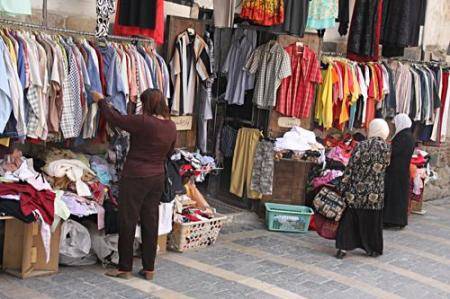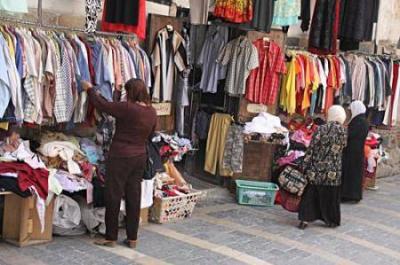With the worsening economic crisis in the country and the dwindling purchasing power of most Lebanese, except for essentials, the trade in used clothing has flourished. Stores known as "outlets" have gained popularity after global brands have left the local markets, and the market for second-hand clothes or "baleh" has seen significant demand in recent years, particularly in poorer areas, especially after moving online.
Sanaa works at a prestigious school in the capital, and she noticed a remarkable change in the clothing of students and teachers upon returning to in-person classes this year. Whereas previously every day featured different shoes, now each season sees students with only one or at most two pairs. Regarding clothing, Sanaa noted that "brands have almost disappeared from clothing," and for those who are still wearing them, she suggests they were sent from abroad, most of which are from previous years or were purchased from one of the outlet stores.
As for the teachers, their clothes are from previous years, and keeping up with popular trends is no longer a part of their discussions or priorities, especially since their salaries barely cover transportation costs in addition to daily needs and family expenses, she mentions. Sanaa has two daughters and, with winter approaching, she allocated this month’s salary to cover their needs. They took a quick look at the websites of the stores they used to shop at, only to find that a single item exceeded one and a half million Lebanese Liras, sometimes reaching seven million or more. As for the outlet stores, the prices are “through the roof,” as Sanaa puts it, so "we went together last weekend to the markets in Tripoli, where we bought our needs for clothes, jackets, and winter shoes."
Regarding her first experience visiting the "baleh," Sanaa mentioned that she was not overwhelmed with happiness, and her daughters did not enjoy the experience too much, but “circumstances have their requirements.” She pointed out that the prices in the "baleh" are in dollars, with a slight difference that bargaining with the seller over prices is possible, yet the items available are not “the latest fashion” but some are of very good quality and some are from global brands.
Where do these items come from? The head of the "Barbour Traders Association," Rashid Kaba, mentioned in a conversation with "Al-Markazia" that the trade of this type of clothing is increasing in Lebanon under current conditions, as the percentage of citizens capable of buying new clothes at current prices has significantly decreased. He noted that this phenomenon is also popular among refugees.
He points out that it is a profitable business, as it includes items with "defects in manufacturing" or "end of series" (this category is usually sold in outlets), where the seller fixes the flaw and then sells it as a new piece at a low price. He indicated that "baleh" arrives in Lebanon in burlap sacks as concealed goods, then traders sort it and sell it.
Ten percent of these goods are shipped as donations from foreign charities and delivered to local associations to be distributed for free as a form of assistance to residents, but some of them price them and sell them. He adds that 70% of them enter through illegal crossings, "smuggling," to avoid paying customs fees and to reduce costs. The remaining 20% enters the country legally.
He points out that the market for these clothes is notably active in neighborhoods like Sabra, Bourj Hammoud, Tripoli, Souk al-Ahad, Naba’a, the suburbs, Bekaa, and the south. Despite this, shoppers in this market have noticed a significant increase in the prices of "baleh" shops, which have begun to rival the prices of some new clothes, including those popular in e-commerce, mostly imported from China and Turkey.
Amid the deepening crisis and economic collapse, the Lebanese have lost the luxurious lifestyle they enjoyed for decades. Will the ordeal end, and will business return to normal as global brands reopen their stores in Lebanon, or has the past era transformed, extinguishing Lebanon’s once bright beacon, as President Najib Mikati announced in his speech before the gathering at the Arab Summit two days ago?




